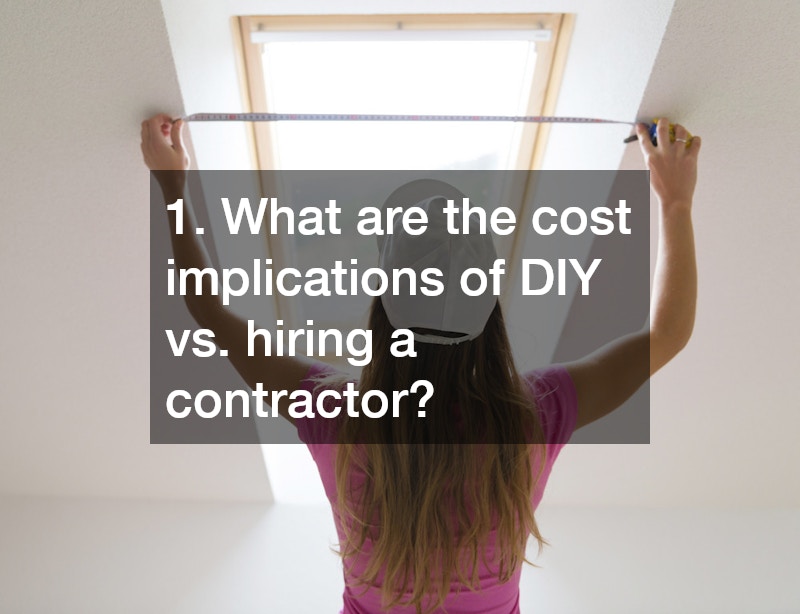Home improvement projects are among the most common investments homeowners make, whether to enhance comfort, improve safety, or boost resale value. As budgets tighten and cost-conscious homeowners take a more active interest in their property’s upkeep, a common question arises: Is it more cost-effective to do the work yourself, or should you hire a professional contractor? The answer isn’t always cut and dry. Each approach has its own financial implications, risks, time commitments, and long-term value considerations.
DIY improvements can be appealing for those who enjoy hands-on work or want to save on labor costs. With endless online tutorials, easily accessible tools, and a wealth of project inspiration, homeowners often feel empowered to tackle upgrades on their own. In some cases, this decision pays off, particularly for simple, cosmetic tasks. However, DIY projects can also lead to costly mistakes, code violations, or safety hazards—issues that may outweigh any initial savings.
Hiring a contractor, on the other hand, involves a professional standard of workmanship, access to specialized tools, industry knowledge, and accountability. Contractors take responsibility for quality, scheduling, permits, and safety, making them a reliable option for complex or high-stakes projects. Of course, professional services come at a higher upfront cost, which means homeowners must consider whether that investment will translate into long-term returns and peace of mind.
This comprehensive guide explores the financial implications, benefits, challenges, and ROI factors associated with both DIY and contractor-based home improvement approaches. By understanding the key differences, you can confidently choose the path that best suits your budget, skills, timeline, and goals.
1. What are the cost implications of DIY vs. hiring a contractor?

Homeowners often assume that DIY projects are always the cheaper option. While it’s true that DIY eliminates labor fees—which can account for 30–60% of a project’s total cost—the true financial picture is more nuanced. Project complexity, materials, skill level, tools, and the potential for mistakes can significantly influence overall expenses. Whether you’re painting a bedroom or tackling local roof repairs, the balance between savings and risks can shift dramatically.
DIY Savings Potential: DIY can save homeowners thousands of dollars, especially for projects where labor is typically expensive. Painting, simple landscaping tasks, minor demolition, and cosmetic upgrades often offer the highest savings with the lowest risk. But these savings assume you complete the task correctly on the first attempt. A project done improperly may require rework—often by a professional—which can double or triple your expenses.
Hidden DIY Costs: Many homeowners underestimate the cost of tools, equipment rentals, safety gear, and materials. Additionally, DIYers may not have access to contractor pricing or bulk discounts, making materials more expensive per unit.
Contractor Cost Considerations: Hiring a contractor increases upfront expenses, but it often reduces long-term costs by ensuring the project meets professional standards, passes inspections, and avoids premature repairs. Contractors are also insured, meaning you’re not personally liable for on-site accidents—a financial safeguard many homeowners overlook.
The financial question isn’t simply “What’s cheaper today?” but “What provides the best value over time?” That’s where ROI becomes essential.
2. How does the quality of work compare between DIY and contractors?
Quality is one of the biggest differentiators between DIY and contractor work. While some homeowners are skilled enough to take on intermediate projects with excellent results, many projects require expert techniques, specialized tools, and industry knowledge—especially tasks involving structural elements or safety features, such as porch railings.
DIY Quality Levels Vary Widely:
DIY outcomes depend on the homeowner’s skill level, attention to detail, and available time. Online tutorials can be helpful, but they can’t replace hands-on experience. Sloppy paint lines, uneven tilework, improper measurements, or weak structural supports are common DIY pitfalls.
Professional Quality Offers Consistency:
Contractors deliver consistent, reliable quality due to training, experience, and professional-grade tools. Their reputation depends on customer satisfaction, motivating them to produce durable, code-compliant results.
Inspection Readiness:
Projects involving wiring, plumbing, structural changes, or safety installations must pass inspection. DIY attempts often fail inspection due to missing permits or improper methods, triggering costly corrections.
Resale Considerations:
Home buyers easily spot amateur work. Poor workmanship can lower home value or deter potential buyers. Contractor-completed projects, however, often boost resale appeal because they provide peace of mind.
3. What time commitments are involved for DIY vs. hiring a contractor?
Time is another crucial component of ROI. Even if DIY saves money, the project may cost more in time, disruption, and stress. Tasks such as painting a room or installing shelves may only take a few hours or a weekend, but intensive projects—such as mold remediation—require significant effort, strict safety protocols, and predictable scheduling.
DIY Time Challenges:
DIY projects often take longer because homeowners must learn techniques, plan each step, gather tools, and troubleshoot unexpected problems. A task that takes a contractor one day may take a DIYer several weekends.
Contractor Efficiency:
Professionals have crews, equipment, and experience that streamline workflow. They manage the project timeline, coordinate labor, and ensure continuous progress.
Opportunity Cost:
Your time has value, too. If a DIY project eats into work hours, family time, or personal well-being, the savings may not be worth it. Contractors reduce disruption by completing projects faster and more efficiently.
4. How do potential risks and liabilities compare in DIY vs. contractor projects?

Risk is often underestimated in home improvement decisions. Whether dealing with heavy machinery, heights, chemicals, or electrical systems, DIYers expose themselves to hazards—often without realizing it. This is especially relevant for tasks typically handled by local roofers, electricians, plumbers, and other licensed professionals.
DIY Risks:
- Personal injury
- Property damage
- Electrical fires
- Water leaks and mold
- Structural failure
- Code violations
- Voiding manufacturer warranties
- Insurance complications
If a DIY project causes damage—say a roof patch fails and water leaks—your homeowner’s insurance may deny the claim if the work wasn’t professionally done.
Contractor Protections:
Licensed contractors carry insurance that protects both themselves and the homeowner. If the contractor makes an error, they must fix it at no additional cost. This layer of protection significantly reduces liability and financial exposure.
5. Which types of projects are more suitable for DIY?
Some projects are perfect for homeowners who enjoy hands-on work, have moderate skills, or want to save money without risking major complications. Tasks involving décor, organization, basic carpentry, light landscaping, and minor repairs usually fall into this category. For example, simple yard tasks are often handled personally rather than hiring a paving company, unless heavy equipment or grading work is involved.
Ideal DIY Projects Include:
- Interior painting
- Caulking and sealing
- Installing shelves or curtain rods
- Basic landscaping
- Replacing cabinet hardware
- Small drywall patches
- Basic flooring (peel-and-stick, laminate)
- Assembling furniture or built-ins
These tasks allow homeowners to enjoy savings and personal satisfaction without risking structural or safety problems.
6. What projects should always be handled by contractors?
Some projects are too risky, complex, or regulated for DIY. Tasks involving plumbing, electrical work, structural changes, hazardous materials, and major mechanical systems should be completed by licensed professionals. Jobs typically performed by a local plumber, electrician, roofer, or general contractor often require permits and inspections.
Projects That Require a Contractor:
- Electrical panel upgrades
- Plumbing system installations
- HVAC repairs
- Roofing replacement
- Foundation repairs
- Asbestos or mold remediation
- Structural wall removal
- Large-scale renovations
Attempting these projects without proper training can cause safety hazards, legal issues, and expensive future repairs.
7. How do you evaluate your own DIY skills and limitations?

Self-awareness is essential when deciding between DIY and professional help. Many homeowners overestimate their abilities or underestimate project difficulty. Before tackling any project, honestly assess your comfort level and experience with tasks that professional landscaper businesses and contractors handle regularly.
Evaluate Yourself Based On:
- Past experience with similar projects
- Comfort with tools
- Ability to follow detailed instructions
- Patience and precision
- Physical ability
- Willingness to manage frustration
- Access to necessary equipment
- Understanding of codes and permits
If you lack confidence or feel overwhelmed during the planning phase, it may be best to hire a contractor.
8. How do contractors add value to complex projects?
Contractors bring expertise, efficiency, and strong problem-solving abilities to home improvement projects. Their extensive knowledge adds value not only in the immediate quality of the workmanship but also in the long-term durability, safety, and functionality of your home. Whether they are coordinating design elements or managing multiple trades for projects involving lawn care services, construction crews, or roofing specialists, contractors streamline the entire process to reduce delays, prevent miscommunications, and ensure that every step meets professional standards.
One of the most significant advantages contractors offer is proper project planning. They understand the sequence of tasks required, the potential challenges that may arise, and the resources needed to complete the work correctly and efficiently. Contractors also provide assurance that projects will meet building codes and safety regulations, protecting homeowners from legal issues or failed inspections. Another benefit is their access to name-brand materials at discounted rates, which can lower costs while improving overall quality.
In addition, contractors are skilled at coordinating labor, ensuring that each specialist or trade professional works in harmony with the project timeline. This level of organization contributes to high-quality results that are difficult for DIY homeowners to replicate. Their work is often backed by warranties, offering peace of mind and protection long after the project is completed. Professional craftsmanship can also significantly improve a home’s resale value, as buyers appreciate well-executed upgrades and repairs that demonstrate care and expertise.
9. How can you ensure a good return on investment with either choice?
Whether choosing a DIY approach or hiring a contractor, homeowners can maximize their return on investment by making informed decisions, planning carefully, and keeping long-term property value in mind throughout the process. Even straightforward tasks such as wood fence installation can significantly affect curb appeal and resale value, making it essential to approach every project with quality and strategy.
One effective way to boost ROI is to select materials that offer a strong balance between durability and cost. Choosing high-quality materials not only extends the lifespan of your improvements but also reduces the likelihood of future repairs. Homeowners also benefit from sticking to timeless, widely appealing designs rather than trends that may quickly become outdated and reduce buyer interest. Before committing to a contractor, gathering multiple estimates ensures competitive pricing and allows you to compare the scope of work, warranties, and proposed timelines.
It is equally important to understand your own skill level and avoid taking on projects that exceed your capabilities, as mistakes can be costly to fix. Keeping organized records and receipts supports future resale discussions and demonstrates responsible maintenance to potential buyers. Securing the proper permits—whether for DIY or contractor projects—helps avoid compliance issues, fines, or complications during home inspections. Researching which improvements add the most value in your specific area also guides smarter project choices. Ultimately, ROI involves much more than finances; it also reflects long-term function, safety, and peace of mind.
10. What are the emotional and personal satisfaction differences between DIY and contractor-completed projects?

The emotional aspect of home improvement is often overlooked but plays a meaningful role in decision-making. For some homeowners, the satisfaction of completing a DIY project is unmatched. For others, the stress of managing tools, schedules, and mistakes isn’t worth the effort—especially when tasks like window glass repair require steady hands and expertise.
DIY Satisfaction Includes:
- Pride in craftsmanship
- Learning new skills
- Personal connection to your home
- Full control over designs and timelines
But DIY can also bring:
- Frustration
- Anxiety
- Uncertainty
- Overwhelm during unexpected issues
Contractor Satisfaction Includes:
- Peace of mind
- Professional-quality results
- Fast, predictable timelines
- Freedom from stress or physical labor
Your personal preferences, personality, and lifestyle will influence which option feels most rewarding.
Choosing between DIY and hiring a contractor is a significant decision that affects your home’s value, safety, appearance, and long-term functionality. DIY projects can offer cost savings, creativity, and personal satisfaction, but they also come with risks, learning curves, and time demands. In contrast, contractors provide expertise, quality assurance, and efficiency—benefits that often justify the higher upfront investment.
Ultimately, the best option depends on the complexity of the project, your skill level, your time availability, and your long-term goals. By carefully weighing cost, quality, risk, and emotional factors, you can make an informed decision that ensures the best possible return on investment—both financially and personally. Whether you decide to roll up your sleeves or hire a seasoned professional, the right choice will bring value, comfort, and confidence to your home improvement journey.



